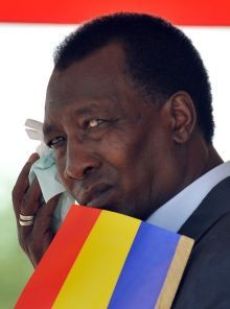Sudan pledged to remove Chadian rebels from border – President Deby
October 20, 2009 (PARIS) — Sudan has agreed to remove Chadian rebels from the joint border with Chad in order to stop their military action against Ndjamena government, Chadian President said today.

Speaking to Radio France Internationale from Paris, President Idriss Deby said Sudanese President Omer Hassan Al-Bashir had committed himself to remove the Chadian rebels and to confine them far from the border. He also said he agreed to allow Sudan to verify the presence of Darfur rebels in his country.
“The special envoy made a commitment, on behalf of President Al-Bashir, which is the removal of mercenaries from the border, confining them elsewhere. Therefore we also made commitments which consist of allowing the Sudanese to come inside our territory, [to verify] whether there are camps of Sudanese opposition members in particular the group JEM [Justice and Equality Movement].”
“Therefore, the path is open to a direct dialogue with Sudan,” he added.
Deby concluded today a five-day private visit to Paris where he tackled on the Chad – Sudan relations with the French President Nicolas Sarkozy last Friday.
Following the meeting, Deby told reporters that the two countries have initiated direct dialogue “which will be under the gaze of UN or friendly countries, provided that the Sudanese government meets its commitments.”
The two countries traded accusations of supporting respective rebel groups since four years. They signed different agreements sponsored by Libya, Saudi Arabia, Senegal and the Qatar but they failed to implement.
The lack of trust between the two countries is seen as major factor hampering attempts to reconcile the two countries.
However analysts agree the two governments have no interest in the continuation of tension between them because it slows down chances of political stability and development. Khartoum needs the help of all its neighbors to end the six year conflict in Darfur and run general elections next year while for Ndjamena the rebellion has drawn the attention of the international community on the need for democratic reform and political freedoms in Chad.
(ST)
